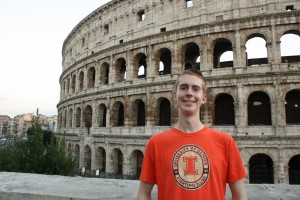PHL Scholar Report: Eyes open to a global problem
By Matthew Niewiara, University of Illinois sophomore, studying agricultural and biological engineering
Seven University of Illinois students were sponsored to attend the First International Congress on Postharvest Loss Prevention in Rome, Italy. They have written about their experiences for the #PreventPHL blog campaign.
This is the first in a series of posts. For more from Congress attendees, visit this link. For more from our PHL Scholars, look for PHL Scholar Reports.
When I came back to school to start the fall semester, I had no idea I would have the opportunity to attend The First International Congress on Postharvest Loss Prevention in Rome, Italy. Looking back, I believe that this experience is a pivotal moment in my college career. My most valuable takeaway from the Congress is a new awareness of how significant the issue of postharvest loss (PHL) is. Before the Congress, I knew food waste was a problem, but I didn’t realize how significant estimates for global PHL were. Hearing that roughly a third of food is lost globally made me realize how large this problem is.
One speaker that impacted me was C.D. Glin from the Rockefeller Foundation. It was interesting to hear his thoughts on PHL from a business perspective. Even with aid from large organizations such as the Rockefeller Foundation, it comes down to selecting projects that will have the largest impact. One thing he said that stood out to me is that there is “no app for optimizing PHL prevention.” I thought this was a great way to describe that PHL prevention is a very dynamic problem with many possible solutions – some of which might not have even been thought of yet.
Another distinguished speaker, Ertharin Cousin of the World Food Programme, talked about how during the 1974 World Food Congress, a goal of 50 percent reduction of losses by 1985 was created, but unfortunately not accomplished. Her statement made me realize that no matter how great a plan may sound on paper, to create any real change there must be concrete action.
One of the unique things I learned about at the Congress was a product called Edipeel from Apeel Sciences. This technology involves a very thin, natural coating applied to produce that significantly extends shelf life. A video demonstrating their technology showed the aging of various fruits and vegetables with and without Edipeel. I was amazed to see how much longer the Edipeel protected produce lasted in the side-by-side time lapse video.
At a Congress like this with a long list of distinguished attendees, one might expect an intimidating environment for undergraduate students. However, it was the exact opposite. All the professionals at this event were very willing to talk to us, and that made the experience as a whole even more valuable.
After learning how large of an issue PHL is, I am very much interested in continuing to learn about potential solutions. I hope to take additional courses related to PHL prevention in the future. A problem this large likely won’t disappear in the next few years, so I could see myself pursuing a career related to this issue.
The blog entries in this #PreventPHL series are by students and members of our PHL Prevention community of practice. The opinions expressed are those of the individual authors and do not necessarily reflect the position of the ADM Institute. In addition, none of the statements should be considered an endorsement of any person, product, or technique by the ADM Institute.



Add Comment